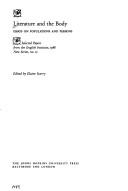| Listing 1 - 3 of 3 |
Sort by
|
Book
ISBN: 9781800348462 9781800345539 Year: 2021 Publisher: Liverpool Liverpool University Press
Abstract | Keywords | Export | Availability | Bookmark
 Loading...
Loading...Choose an application
- Reference Manager
- EndNote
- RefWorks (Direct export to RefWorks)
This book examines the representation of the female fertility cycle in contemporary Algerian, Mauritian, and French women's writing. It focuses on menstruation, childbirth, and the menopause whilst also incorporating experiences such as miscarriage and abortion. This study frames its analysis of contemporary women's writing by looking back to the pioneering work of the second-wave feminists. Second-wave feminist texts were the first to break the silence on key aspects of female experience which had thus far been largely overlooked or considered taboo. Second-wave feminist works have been criticised for applying their 'universal' theories to all women, regardless of their ethnicity, socio-economic status, or sexuality. This book argues that contemporary women's writing has continued the challenge against normative perceptions of the body that was originally launched by the second-wave feminists, whilst also taking a more nuanced, contextual and intersectional approach to corporeal experience. The cross-cultural and interdisciplinary approach of this book is informed not only by critics of the second-wave feminist movement but also by sociological studies which consider how women's bodily experiences are shaped by socio-cultural context.
Algerian literature (French) --- Fertility, Human, in literature --- French literature --- Women authors --- History and criticism

ISBN: 0801836042 Year: 1988 Publisher: Baltimore (Md.) : Johns Hopkins university press,
Abstract | Keywords | Export | Availability | Bookmark
 Loading...
Loading...Choose an application
- Reference Manager
- EndNote
- RefWorks (Direct export to RefWorks)
Book
ISBN: 9781501710704 1501710702 1501710710 1501710729 9781501710728 9781501710711 1501761714 Year: 2018 Publisher: Ithaca, NY
Abstract | Keywords | Export | Availability | Bookmark
 Loading...
Loading...Choose an application
- Reference Manager
- EndNote
- RefWorks (Direct export to RefWorks)
From the teeming streets of Dickens's London to the households of domestic fiction, nineteenth-century British writers constructed worlds crammed beyond capacity with human life. In 'Populating the Novel', Emily Steinlight contends that rather than simply reflecting demographic growth, such pervasive literary crowding contributed to a seismic shift in British political thought. She shows how the nineteenth-century novel in particular claimed a new cultural role as it took on the task of narrating human aggregation at a moment when the Malthusian specter of surplus population suddenly and quite unexpectedly became a central premise of modern politics. In readings of novels by Mary Shelley, Elizabeth Gaskell, Charles Dickens, Mary Braddon, Thomas Hardy and Joseph Conrad that link fiction and biopolitics, Steinlight brings the crowds that pervade nineteenth-century fiction into the foreground.
English fiction --- Population in literature --- Fertility, Human, in literature --- Malthusianism --- History and criticism --- Malthusianism. --- Fertility, Human, in literature. --- Population in literature. --- Eugenics --- Population --- History and criticism. --- population in nineteenth century literature, Victorian biopolitics, Victorian fiction and the masses, the nineteenth century British novel and demography, Malthus and literature.
| Listing 1 - 3 of 3 |
Sort by
|

 Search
Search Feedback
Feedback About UniCat
About UniCat  Help
Help News
News